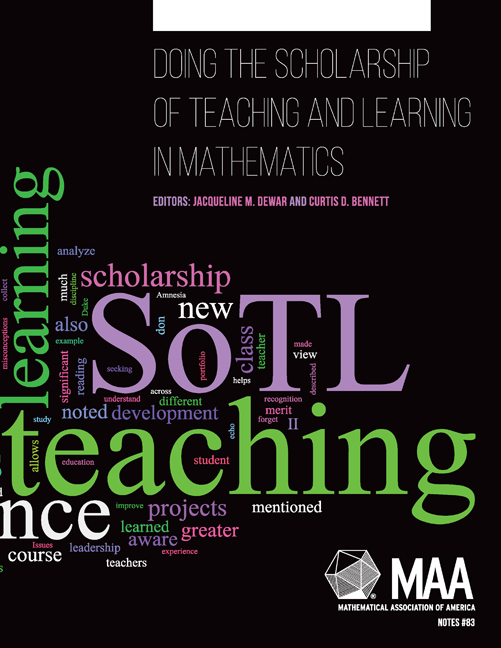20 - Synthesis of the Value and Benefits of SoTL Experienced by the Contributors
from Epilogue
Summary
Editors' Commentary
The primary goal for this volume is to provide guidance for mathematics faculty members interested in undertaking a scholarly study of their teaching practice, but a secondary goal is to promote a greater understanding of this work and its value to the mathematics community. In this chapter we reflect on the value of SoTL, generally, and take stock of the outcomes and benefits that accrued to the 25 contributing authors as a result of their scholarly inquiries into teaching and learning.
Introduction
In 1999, Lee Shulman, then President of the Carnegie Foundation for the Advancement of Teaching, wrote entertainingly and perceptively about what it looks like when learning does not go well (Shulman, 1999). He coined a “taxonomy of pedago-pathology” consisting of amnesia, fantasia, and inertia. According to Shulman, amnesia refers to students forgetting, as a matter of course, what they learned. He joked that sometimes they even forget that they attended some classes. Fantasia denotes persistent misconceptions, where students are unaware that they misunderstand. Finally, inertia signifies that students are unable to use what they learned.
We suggest that teaching possesses similar pathologies. Amnesia is a good label for the many things about our teaching we forget from one semester to the next, things that went well and things that didn't, even when we are teaching the same course. In fact, Shulman called this “pedagogical amnesia” (as cited in Hutchings, 1998, p.17). Without observing and collecting data, we have little evidence or direction for improving and are unlikely to learn from our mistakes. The remainder of the taxonomy also transfers. Fantasia refers to our misconceptions about what students bring to class, think, learn, find difficult, or don't understand. Inertia signifies that we continue to teach as we have in the past independent of whether or not students are learning all that we want them to learn.
The chapters in Part II showed how the scholarship of teaching and learning helps instructors escape these pathologies.
- Type
- Chapter
- Information
- Doing the Scholarship of Teaching and Learning in Mathematics , pp. 203 - 206Publisher: Mathematical Association of AmericaPrint publication year: 2014



